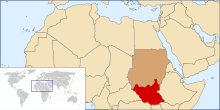Southern Sudan Autonomous Region (1972–1983)
The Southern Sudan Autonomous Region was an autonomous region that existed in southern Sudan between 1972 and 1983.[1] It was established on 28 February 1972 by the Addis Ababa Agreement which ended the First Sudanese Civil War.[2] The region was abolished on 5 June 1983 by the administration of Sudanese President Gaafar Nimeiry.[3] Revocation of southern autonomy was one of the causes of the Second Sudanese Civil War which would continue until January 2005, when southern autonomy was restored; the region became the independent Republic of South Sudan in 2011.
| Southern Sudan Autonomous Region | |||||||||
|---|---|---|---|---|---|---|---|---|---|
| Autonomous region of Sudan | |||||||||
| 1972–1983 | |||||||||
 Map showing Southern Sudan (red) within Sudan (darker brown). | |||||||||
| Capital | Juba | ||||||||
| Area | |||||||||
• 1983 | 619,745 km2 (239,285 sq mi) | ||||||||
| Population | |||||||||
• 1983 | 5,466,700 | ||||||||
| Government | |||||||||
| • Type | Autonomous region | ||||||||
| President of the High Executive Council | |||||||||
• 1972–1978 (first) | Abel Alier | ||||||||
• 1982–1983 (last) | Joseph James Tombura | ||||||||
| Legislature | People's Regional Assembly | ||||||||
| History | |||||||||
| 28 February 1972 | |||||||||
• Autonomy abolished | 5 June 1983 | ||||||||
| |||||||||
| Today part of | |||||||||
Government and politics
editSouthern Sudan was governed by a High Executive Council which was led by a President of the High Executive Council. Abel Alier was the first President, holding that post between 1972 and 1978.
Legislative authority was vested in a People's Regional Assembly.
The autonomous region consisted of the three provinces of Equatoria, Bahr al-Ghazal, and Greater Upper Nile. Juba was the regional capital.
| No. | Portrait | Name (Birth–Death) |
Term of office | Political party | Elected | ||
|---|---|---|---|---|---|---|---|
| Took office | Left office | Time in office | |||||
| 1 | Abel Alier (born 1933) | 6 April 1972 | February 1978 | 5 years, 301 days | SF | – | |
| 2 | Joseph Lagu (born 1931) | February 1978 | 12 July 1979 | 1 year, 161 days | SANU | – | |
| 3 | Peter Gatkuoth (1938–2010) | 12 July 1979 | 30 May 1980 | 323 days | Independent | – | |
| (1) | Abel Alier (born 1933) | 30 May 1980 | 5 October 1981 | 1 year, 128 days | SF | – | |
| 4 | Gismalla Abdalla Rassas (1932–2013) | 5 October 1981 | 23 June 1982 | 261 days | Independent | – | |
| 5 | Joseph James Tombura (1929–1992) | 23 June 1982 | 5 June 1983 | 347 days | SANU | – | |
Post-abolition
editThe Southern Sudan Autonomous Region was abolished in 1983. Between 1987 and 1989 a Council for the South existed in Southern Sudan. Following the signing of the Khartoum Peace Agreement of 1997, a Southern Sudan Coordination Council was established initially led by Riek Machar who was also appointed Assistant to the President of the Republic.[4] This body was abolished in 2005 when the Autonomous Government of Southern Sudan was established.[5]
See also
edit- South Sudan
- Comprehensive Peace Agreement
- Southern Sudan Autonomous Region (2005–2011), the autonomous region that existed between 2005 and independence in 2011
- Southern Sudanese independence referendum, 2011
References
edit- ^ Ben Cahoon. "The Sudan". Worldstatesmen.org. Retrieved 29 February 2016.
- ^ "武蔵村山市新築図録 | 武蔵村山市には新築がいっぱい♪" (PDF). Splamilitary.net. Archived from the original (PDF) on 10 July 2012. Retrieved 29 February 2016.
- ^ Daniel Thabo Nyibong (6 October 2010). "History Of Southern Sudan". Archived from the original on 16 July 2011. Retrieved 5 July 2023.
- ^ https://peacemaker.un.org/sites/peacemaker.un.org/files/SD_970421_SudanPeaceAgreement.pdf [bare URL PDF]
- ^ Ben Cahoon. "Southern Sudan". Worldstatesmen.org. Retrieved 29 February 2016.